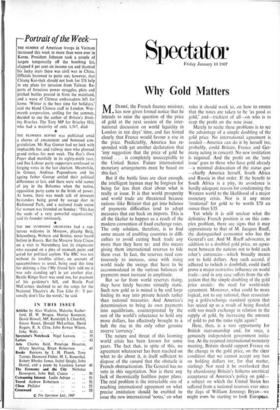Why Gold Matters
But if the battle lines are clear enough, the intelligent layman may be forgiven for being far less than clear about what is really at issue. It is that world prosperity and world trade are threatened because nations (like Britain) that get into balance of payments difficulties tend to adopt measures that cut back on imports. This is all the likelier to happen as a result of the modern convention of fixed exchange rates. The only solution, therefore, is to find some means of enabling countries in diffi- culties to avoid cutting back trade any more than they have to: and this means giving them international reserves to tide them over. In fact, the reserves need con- tinuously to increase, since with rising world trade the swings that have to be accommodated in the various balances of payments must increase in amplitude.
But so far from world reserves rising, they have lately become virtually static. Such new gold as is mined is by and large finding its way into private hoards rather than national treasuries. And America's determination to bring its own payments into equilibrium, counterpointed by the rest of the world's reluctance to hold any more dollars, has effectively brought to a halt the rise in the only other genuine reserve 'currency.'
The nature and threat of this looming world crisis has been known for some years. The fact that, in spite of this, no agreement whatsoever has been reached on what to do about it, is itself sufficient to dispose of the canard that the obstacle is French obstructionism. The General has no veto in this negotiation. Nor is there any lack of theoretically faultless paper plans. The real problem is the intractable one of reaching international agreement on what precise institution should be enabled to issue the new international 'notes,' on what rules it should work to, on how to ensure that the notes are taken to be 'as good as gold,' and—trickiest of all—on who is to reap the profit on the note issue.
Merely to recite these problems is to see the advantage of a simple doubling of the gold price. No international agreement is needed—America can do it by herself (so, probably, could Britain, France and Ger- many acting in concert). No new institution is required. And the profit on the 'note issue' goes to those who have gold already —a minimal dislocation of the status quo —chiefly America herself, South Africa and Russia in that order. If the benefit to South Africa is a pity, its avoidance is hardly adequate reason for condemning the Western world to the likelihood of a major monetary crisis. Nor is it any more 'irrational' for gold to be worth $70 an ounce than $35.
Yet while it is still unclear what the definitive French position is on this com- plex problem, there are signs that it may approximate to that of M. Jacques Rueff, the distinguished economist who has the General's ear. And M. Rueff advocates, in addition to a doubled gold price, an agree- ment between the nations not to hold each other's currencies—which broadly means not to hold dollars. Any such accord, if adhered to (which is doubtful), could itself prove a major restrictive influence on world trade—and in any case suffers from the ob- jection that the simple doubling of the gold price avoids : the need for world-wide agreement. Moreover, what could be more logical, not to say rational, than resuscitat- ing a gold-exchange standard system that has seized up as a result of being flooded with too much exchange in relation to the supply of gold, by increasing the amount of gold to put the ratio right again?
Here, then, is a rare opportunity for British statesmanship and, for once, a genuinely independent government initia- tive. At the resumed international monetary meeting, Britain should support France on the change in the gold price, on the clear condition that we cannot accept any ban on holding dollars (or, for that matter, sterling). Nor need it be overlooked that by abandoning Britain's hitherto uncritical acceptance of America's policy on gold— a subject on which the United States has suffered from a national neurosis ever since the days of William Jennings Bryan—we might even be starting to look European.






























 Previous page
Previous page